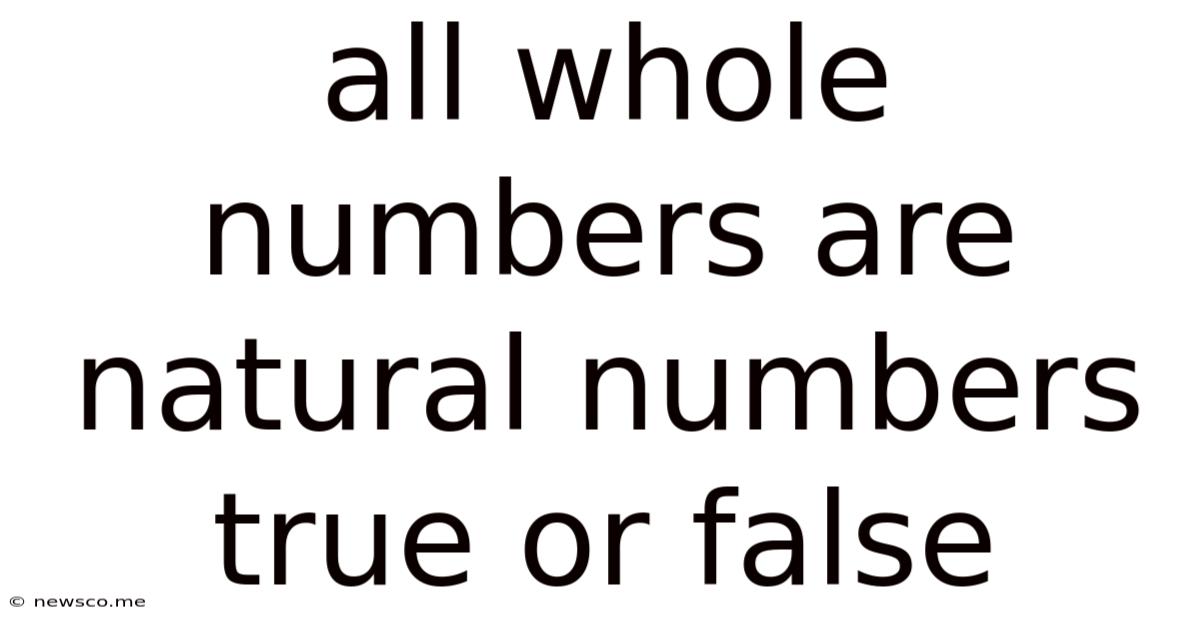All Whole Numbers Are Natural Numbers True Or False
News Co
Apr 15, 2025 · 4 min read

Table of Contents
Are All Whole Numbers Natural Numbers? Exploring the Truth
The question, "Are all whole numbers natural numbers?" sparks a fundamental discussion in mathematics, particularly within the realms of set theory and number systems. While seemingly straightforward, the answer requires a nuanced understanding of the definitions of whole numbers and natural numbers. This article will delve into the precise definitions of these number sets, explore the relationship between them, and ultimately answer the titular question definitively. We'll also examine common misconceptions and explore the practical implications of this distinction in various mathematical contexts.
Defining Natural Numbers and Whole Numbers
To definitively answer the question, we must first precisely define "natural numbers" and "whole numbers." These definitions aren't universally consistent across all mathematical literature, but the most common and widely accepted definitions are:
Natural Numbers (ℕ)
Natural numbers, often denoted by the symbol ℕ, represent the set of positive integers starting from 1 and extending infinitely. This set is also known as the set of counting numbers. Therefore, the natural numbers are:
- 1, 2, 3, 4, 5,...
This definition is the most commonly accepted, though some mathematicians include 0 in the set of natural numbers. This variation creates a slight ambiguity that needs to be addressed depending on the context.
Whole Numbers (𝕎)
Whole numbers, commonly denoted by 𝕎, encompass the set of non-negative integers. This set includes zero and all the positive integers. Therefore, the whole numbers are:
- 0, 1, 2, 3, 4, 5,...
The key difference between the natural numbers and whole numbers lies in the inclusion of zero. This seemingly small difference has significant implications for certain mathematical operations and theorems.
The Relationship Between Whole Numbers and Natural Numbers
Given the definitions above, the relationship between whole numbers and natural numbers becomes clear:
The set of natural numbers is a proper subset of the set of whole numbers. This means that all natural numbers are also whole numbers, but not all whole numbers are natural numbers. The number 0 is the only whole number that is not a natural number (using the most common definition of natural numbers).
We can represent this relationship using set notation:
ℕ ⊂ 𝕎
This notation signifies that ℕ is a subset of 𝕎. The "proper subset" implication arises because there's at least one element in 𝕎 (namely, 0) that is not in ℕ.
Answering the Question: True or False?
Therefore, the statement "All whole numbers are natural numbers" is false. While all natural numbers are whole numbers, the converse is not true. The whole number set contains an additional element, zero, which is excluded from the common definition of natural numbers.
Common Misconceptions and Clarifications
Several misconceptions surround the distinction between natural and whole numbers. Let's address some common misunderstandings:
-
Conflation of Counting and Number Systems: The act of counting often begins with 1, leading to the mistaken belief that natural numbers and whole numbers are synonymous. However, mathematical systems are defined formally, and these definitions explicitly distinguish between the two sets.
-
Context-Dependent Definitions: As mentioned earlier, some definitions of natural numbers do include 0. It's crucial to always check the specific definition being used within a given mathematical context to avoid confusion. In this article, we adhere to the most widely accepted definition excluding 0 from the natural numbers.
Practical Implications and Mathematical Applications
The distinction between natural numbers and whole numbers might seem minor, but it has important consequences in various mathematical applications:
1. Factorial Function:
The factorial function (!), commonly used in combinatorics and probability, is defined only for natural numbers. 0! is defined as 1 for convenience, but it extends the function beyond the natural numbers' strict definition.
2. Indexing and Counting:
In computer science and programming, arrays and lists often start their indexing from 0. This use of 0 aligns with the whole number system, not the natural numbers.
3. Set Theory:
Set theory heavily relies on the precise definitions of number sets. The difference between natural and whole numbers is crucial when working with fundamental concepts like cardinality and operations on sets.
4. Mathematical Induction:
The principle of mathematical induction, a powerful proof technique, often starts with a base case involving the natural number 1. This highlights the importance of distinguishing between natural and whole numbers.
5. Number Theory:
Many theorems and properties in number theory deal specifically with either natural numbers or whole numbers, making the distinction critical for precise mathematical statements.
Conclusion: A Necessary Distinction
The distinction between whole numbers and natural numbers is not merely a semantic detail. It represents a fundamental difference in mathematical structure with significant implications in various branches of mathematics and computer science. While the inclusion or exclusion of zero might seem like a minor detail, it dramatically impacts the applications and interpretations of numerous mathematical concepts and theorems. By understanding the precise definitions and the relationship between these number sets, we can avoid confusion and ensure accuracy in mathematical reasoning and problem-solving. Remembering that the set of natural numbers is a proper subset of the whole numbers is key to correctly addressing problems and interpreting mathematical statements. Therefore, the statement "All whole numbers are natural numbers" remains firmly false.
Latest Posts
Related Post
Thank you for visiting our website which covers about All Whole Numbers Are Natural Numbers True Or False . We hope the information provided has been useful to you. Feel free to contact us if you have any questions or need further assistance. See you next time and don't miss to bookmark.